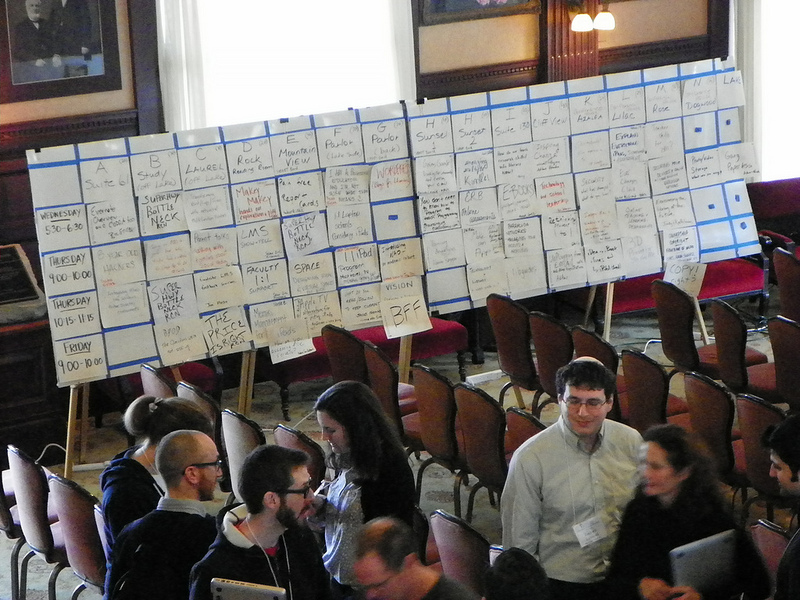In 2010, Loosecubes took the initiative to host a half-day Unconference the day before SXSW. I had not heard of an unconference and it was explained to me as a crowdsourced agenda born out of the BarCamp movement. I went into the Coworking Unconference with an open mind and a lot of questions around how this could possibly work. I was amazed at how quickly ideas that resonated rose to the top and people formed groups to discuss them.
I met coworking leaders from around the globe. I was able to get questions answered by other coworking visionaries. I met people that I would form lasting friendships with and put on stage the following year. I was inspired and fired up to go back to my space and implement some of my new learning. I formed partnerships I would never have imagined and even went to Paris to participate in the European Coworking Conference. All because of an unconference.
I recently looked up the term “unconference” on Wikipedia and was shocked to find it was a method developed by Harrison Owen and published in the book Open Space Technology in 1993. Even by today’s standards I would submit that it’s a pretty new thing, although maybe not for the coworking community, which tends to be full of visionaries, early adopters and leaders.
In planning the Global Coworking Unconference Conference (GCUC – pronounced “juicy”) for 2011, we focused the conference panels on those new to coworking or just exploring coworking. We assumed that everyone already engaged would go to the unconference that was running simultaneously. What we found out is that people (myself included) had missed out on a day of valuable information since we were in the conference track all day. The number one request on our surveys was to not overlap the conference with the unconference.
This year we have day one of GCUC as a conference and day two as an unconference. Already we have had a myriad of relevant topics that we didn’t address on day one show up on the second day. Here is a list of the proposed topics for 2013. It’s a wonderful way to catch all the important topics that would have been missed if we were guessing at what people wanted to hear from us. And it’s a wonderful tool to engage a community in discussion, collaboration and actions.
The good news is that you still get to propose topics on the day of the unconference. Just because something is proposed doesn’t mean it will make it into the actual day – that is up the attendees. As an organizer it’s wonderful and scary, all in one. You can’t control it, you have to just let it happen. We use tools and technology to organize it, but the quality and content is up to the attendees.
In summary, we have an unconference for a number of reasons. It's a tradition that works for this community. I don’t believe for one second that I can cover all the relevant topics in regards to coworking in one day on panel discussions. I have been delighted and amazed at how open and welcoming coworking operators are towards each other. If you have a question, just ask it. If you need help, put it out there. We are all out there trying to make it happen day in and day out. We realize that competition is good for spreading the word on what coworking is at its core.
I’m not sure every industry could embrace this format, but it works like a charm for the coworking community.
The Global Coworking Unconference Conference is March 5-6, 2013 in Austin, Texas.
###
Liz Elam of Link Coworking is the Executive Producer of GCUC.









